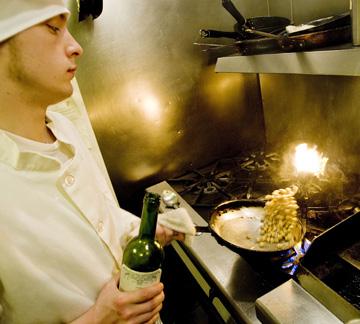Local eatery serves guests unique dining
Jan 31, 2008
Few restaurants have 27 beers on tap. Fewer restaurants have an escalator handrail lining the bar. Fewer still have pneumatic mailing tubes, previously used to send memos in a University building, as light fixtures. Radio Maria, 119 N. Walnut, of downtown Champaign does all of the above.
This two-part restaurant consisting of a dining room and tapas lounge, looks like any other building in Champaign on the outside – brown bricks and big windows – but once inside, you feel like you’ve left the college town and are now in what’s more like an urban establishment. The light green and blue walls are adorned with paintings. Behind the blue light-up bar is something resembling a chandelier. This hangs over a large metal basin with a cylinder with 27 beer taps protruding from the middle.
These contraptions are the work of David Spears, sculptor and co-owner of Radio Maria.
“I’m a big fan of salvaging things, that’s part of what you see,” Spears said. “My interest is in finding things that people don’t use and then recycling them into my designs where people don’t realize what is in front of them.”
The “beer fountain” is made of a hand-washing bowl. The chandelier’s parts include a wind tunnel test chamber shroud from a building that used to stand behind Loomis Lab, as well as a Holophane light bulb from the 1800’s that probably came from a Pullman train car.
Get The Daily Illini in your inbox!
But unique interior design is not the only thing Radio Maria brings to the table.
“Everything is unimportant unless the food is great,” Spears said.
Radio Maria’s cuisine is a combination from cuisines around the world.
Luke Hursey, head chef and kitchen manager, calls Radio Maria’s menu “fusion food,” a combination between Indian, Mediterranean, Asian and Spanish.
The main goal is to provide something different.
“We take elements of high preparations, but we’re not doing it within the confines of French cuisine or Italian cuisine and it gives us the flexibility to make dishes that aren’t just the classics,” David Bohula, manager and sommelier said. “The classics are classics for a reason but most people have had them before and at Radio Maria we’re always trying to push the envelope and try something new.”
Apart from being unique, the food is top quality, Hursey said.
“We order as much organic local food as possible,” he said.
Radio Maria also has an extensive beverage program. Fifteen new specialized drinks are added a month to the menu, and the restaurant makes their own liquors in house as well, Bohula said.
“We have the largest beverage program in downstate Illinois,” he said.
In fact, a restaurant with a full-service bar was the original vision of the owners. But due to complications in restaurant licensing laws and limited space at the time, Spears and co-owner Sharon Owens, who painted the portraits in the restaurant, focused solely on food.
“We were kind of disappointed in what was available in Champaign, culinary-wise,” Spears said. “It was a different downtown. Very few businesses, a lot of boarded up buildings.”
Spears said both he and Owens worked in restaurants before and sought to have their own. With the help of Jeff Mellander, owner of the building where the restaurant is located, the pair was able to create one of the first restaurants in downtown Champaign that provided a night life.
“(Back then) the student body stayed on campus because there were no good restaurants; people felt intimidated to go downtown,” Spears said. “Once we opened up, a couple other places opened up, and it became a place to go out at night.”
Just last year, Spears and Owens were given the opportunity to create the lounge part of the restaurant next door. They turned it into a tapas bar with a completely separate kitchen.
“The lounge has a little (bit of) a faster environment,” Bohula said. “The bar is dominating the room, louder music, a little more energetic. It tends to see a younger age group.”
The overall goal of both sides of the restaurant is to provide a good, unique product in a comfortable environment, Spears said.
“We’re individual artists,” he said. “I hope there is a social conscience and desire for something different than what you get in the commercial structured restaurants.”






